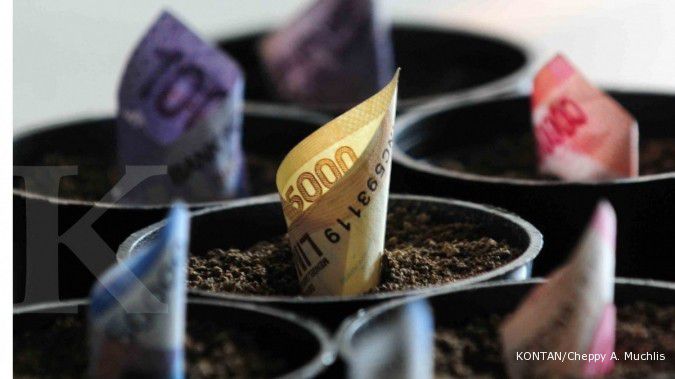JAKARTA. The House of Representatives’ approval of the revision of the 2013 state budget has apparently not impressed many fixed income investors, who are mostly still in a wait-and-see mode in the bonds market. The government bond auction held by the Finance Ministry’s debt management office on Tuesday received a cool reception from investors, reaping only Rp 2.65 trillion (US$267 million), the lowest ever this year and well below the indicative target of Rp 8 trillion. Yields jumped as investors were still worried about uncertainty over fuel subsidies, coupled with concerns of tighter global liquidity ahead of the possible scale down of the US monetary stimulus, famously known as quantitative easing. “We are hoping investors will be more aggressive when bidding in the near future because today is still a transition period, as investors are still waiting for the hike of fuel prices [to take effect]. However, I’m certain that things will get better going forward,” Finance Ministry debt management office head Robert Pakpahan said on Tuesday in his Jakarta office. Weighted average yields for the 10-year notes — deemed as an indicator in the government bonds market — stood at 6.52 percent, surging 0.91 percent compared to the last auction in May. The yields for one-year treasury bills (T-bills) and 20-year notes stood at 5.38 percent and 7.25 percent, respectively, also significantly higher compared to the last auction. Meanwhile, the two-year and five-year debt papers went unsold in the auction as investors demanded high yields that were way above the government’s tolerance level. Incoming bids reached Rp 7.75 trillion, the lowest ever this year, but the government only sold bonds worth Rp 2.65 trillion because most investors demanded too higher yields. Analysts say another factor deterring investors from entering Indonesia’s bonds market was the fact that the Federal Reserve, the US central bank, will hold its board of governors’ meeting on Wednesday (Thursday, Jakarta time) to decide the fate of its quantitative easing policy, which has flushed liquidity into the bond and stock market of emerging economies. “So far, Fed Governor Ben Bernanke only hinted at the possible scale down of quantitative easing. However, this meeting will result in something more tangible — it could determine the direction of US monetary policy,” said Azan Izhar, a Jakarta-based fixed income analyst with PT Ciptadana Securities. Negative sentiment from the possible halt of the US monetary stimulus, coupled with concerns over the government’s fiscal management, has sparked a massive sell-off in the bonds market by foreign investors. Official figures show that foreign ownership of government bonds has declined by Rp 11.2 trillion over the last three weeks. The government is currently racing against time to meet its bonds issuance target to plug the country’s ballooning budget deficit, a tough task given recent turbulence in the global financial market. The government plans to raise an additional Rp 51 trillion from government bonds issuance, according to the revised 2013 state budget. The government is also likely to face tougher competition in finding buyers for its bonds, as Bank Indonesia (BI), the central bank, has stated that it might soon issue one-year debt papers (SBI) as a new monetary instrument, a move that analysts fear might trigger a crowding-out effect in the local bonds market. “With more bonds issuance but less buyers in the bonds market, I think it’s time for the government to tolerate higher yields in the upcoming auctions — it’s a move that the government must take,” said Azan. (Satria Sambijantoro/The Jakarta Post)
Govt bond auction met with cool reception
JAKARTA. The House of Representatives’ approval of the revision of the 2013 state budget has apparently not impressed many fixed income investors, who are mostly still in a wait-and-see mode in the bonds market. The government bond auction held by the Finance Ministry’s debt management office on Tuesday received a cool reception from investors, reaping only Rp 2.65 trillion (US$267 million), the lowest ever this year and well below the indicative target of Rp 8 trillion. Yields jumped as investors were still worried about uncertainty over fuel subsidies, coupled with concerns of tighter global liquidity ahead of the possible scale down of the US monetary stimulus, famously known as quantitative easing. “We are hoping investors will be more aggressive when bidding in the near future because today is still a transition period, as investors are still waiting for the hike of fuel prices [to take effect]. However, I’m certain that things will get better going forward,” Finance Ministry debt management office head Robert Pakpahan said on Tuesday in his Jakarta office. Weighted average yields for the 10-year notes — deemed as an indicator in the government bonds market — stood at 6.52 percent, surging 0.91 percent compared to the last auction in May. The yields for one-year treasury bills (T-bills) and 20-year notes stood at 5.38 percent and 7.25 percent, respectively, also significantly higher compared to the last auction. Meanwhile, the two-year and five-year debt papers went unsold in the auction as investors demanded high yields that were way above the government’s tolerance level. Incoming bids reached Rp 7.75 trillion, the lowest ever this year, but the government only sold bonds worth Rp 2.65 trillion because most investors demanded too higher yields. Analysts say another factor deterring investors from entering Indonesia’s bonds market was the fact that the Federal Reserve, the US central bank, will hold its board of governors’ meeting on Wednesday (Thursday, Jakarta time) to decide the fate of its quantitative easing policy, which has flushed liquidity into the bond and stock market of emerging economies. “So far, Fed Governor Ben Bernanke only hinted at the possible scale down of quantitative easing. However, this meeting will result in something more tangible — it could determine the direction of US monetary policy,” said Azan Izhar, a Jakarta-based fixed income analyst with PT Ciptadana Securities. Negative sentiment from the possible halt of the US monetary stimulus, coupled with concerns over the government’s fiscal management, has sparked a massive sell-off in the bonds market by foreign investors. Official figures show that foreign ownership of government bonds has declined by Rp 11.2 trillion over the last three weeks. The government is currently racing against time to meet its bonds issuance target to plug the country’s ballooning budget deficit, a tough task given recent turbulence in the global financial market. The government plans to raise an additional Rp 51 trillion from government bonds issuance, according to the revised 2013 state budget. The government is also likely to face tougher competition in finding buyers for its bonds, as Bank Indonesia (BI), the central bank, has stated that it might soon issue one-year debt papers (SBI) as a new monetary instrument, a move that analysts fear might trigger a crowding-out effect in the local bonds market. “With more bonds issuance but less buyers in the bonds market, I think it’s time for the government to tolerate higher yields in the upcoming auctions — it’s a move that the government must take,” said Azan. (Satria Sambijantoro/The Jakarta Post)





